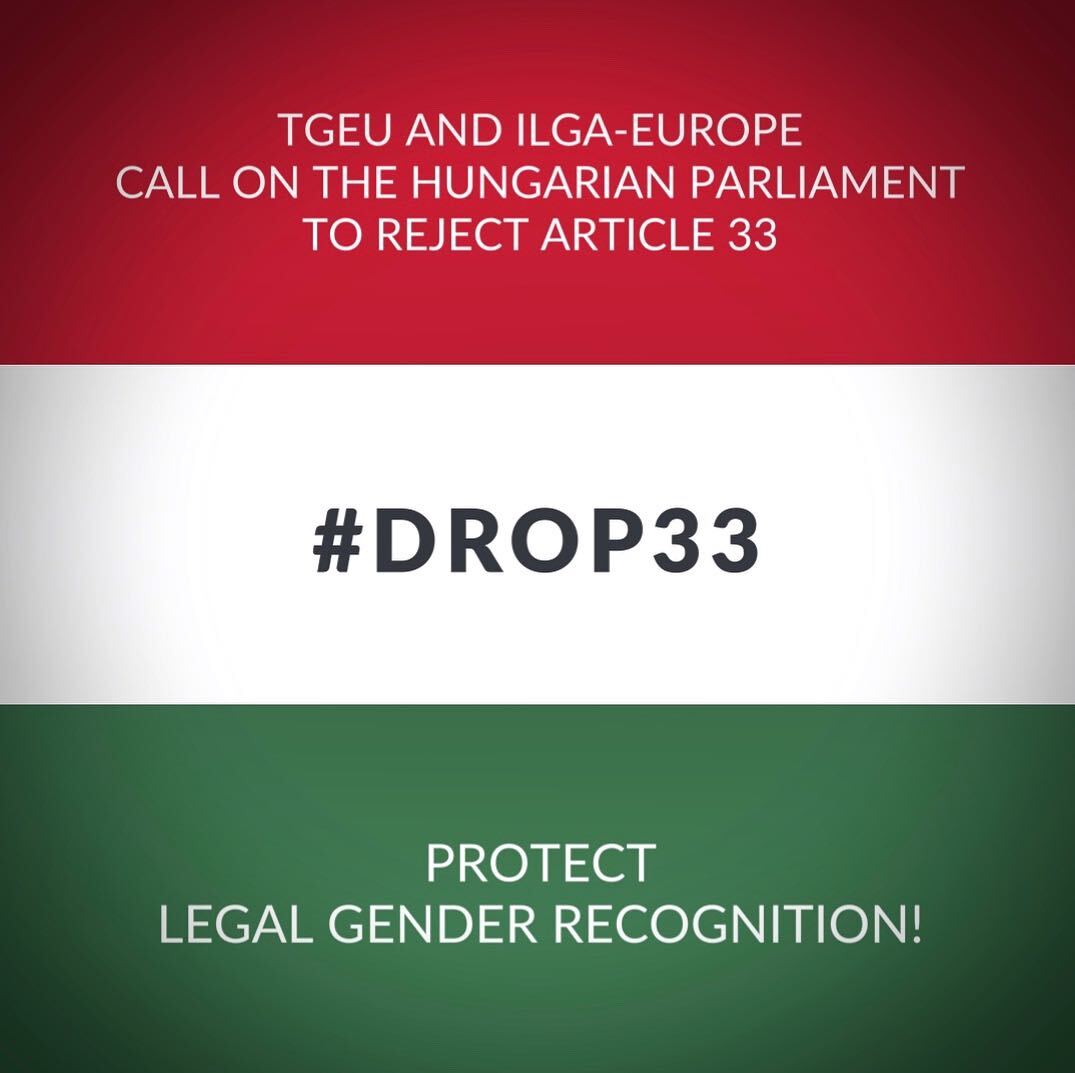Joint Call On Hungarian Parliament Regarding LGR

Europe’s Two Largest Networks of LGBTI and Transgender Organisations call on Hungarian Parliament to Reject Attempts to Ban Legal Gender Recognition
ILGA-Europe and TGEU, the two largest networks of LGBTI and trans organisations in Europe and Central Asia, representing over 800 organisations and groups across the region collectively, are calling on the Hungarian Parliament and the Justice Committee of the Parliament to drop Article 33 of a legislative omnibus bill, which would deny access to legal gender recognition in the country.
The Hungarian government Tuesday, 31 March, released a draft omnibus bill simultaneously amending many laws and provisions. One of the laws proposed for amendment relates to legal gender recognition for trans people – proposing to replace “sex” with “sex assigned at birth” in the national registry and on identity documents, as cited in Article 33 of the omnibus bill.
The cited reasoning for this amendment is:
“The sex entered into the civil registry is based on facts determined by doctors, declared by the registry. The registry certifies the facts and rights it includes until proven otherwise, therefore it does not create rights. However, the sex declared by the registry could create rights or obligations, and therefore it is necessary to define the term of birth sex. Given that completely changing one’s biological sex is impossible, it is necessary to lay it down in law that it cannot be changed in the civil registry either.”
Functionally, this amendment would mean that legal gender recognition would become impossible under any circumstances in Hungary, because all current mentions of “sex” in identity documents would be changed to the immutable characteristic of “sex assigned at birth”. Currently identity documents can be changed in Hungary by law, although processes have been suspended for nearly two years.
The amendment comes at a time when the Hungarian Parliament has given Prime Minister Viktor Orbán power to rule by decree indefinitely because of the COVID-19 crisis, which means he no longer needs to consult other lawmakers before making policy decisions. Orbán’s attacks against the LGBTI community go back to 2015, when he blocked a draft agreement at the Council of the European Union which called on the European Commission to tackle homophobic and transphobic discrimination. He has also refused to ratify the Istanbul Convention because of its definition of gender as a social construct, and in 2017 he hosted the International Organisation of the Family (IOF), a US group which campaigns against same-sex marriage.
The Hungarian people overwhelmingly support access to legal gender recognition for trans people. According to a Median representative survey in September 2019, 70% of respondents believe that trans people should have access to legal gender recognition and only 17% believed that trans people should under no circumstances change their gender or name in their papers.
According to Advocacy Director of ILGA-Europe, Katrin Hugendubel: “Case law from the European Court of human rights clearly establishes the right to legal gender recognition for transgender people. International human rights actors must act firmly and swiftly to stop this extreme rollback in a settled area of human rights law.”
Trans-led Hungarian civil society organisation Transvanilla Transgender Association President Barnabás Hidasi affirms that “legal gender recognition ensures a person’s right to self-determination, and that procedures must be existent, quick, transparent, and accessible”.
“Hungary’s proposed Article 33 runs counter to well-established international human rights standards, including the Council of Europe’s recommendations to member states,” said Masen Davis, interim executive director at Transgender Europe (TGEU). “This dangerous bill would subject trans people in Hungary to increased scrutiny, discrimination, and violence. The Parliament should be focusing on what the people of Hungary to survive the COVID-19 pandemic, not using this crisis as cover to roll back the rights of an already-marginalised group.”
ILGA-Europe and TGEU call on the Hungarian Parliament and the Justice Committee of the Parliament to #Drop33, amending the omnibus bill to protect the fundamental rights of all Hungarians. Further, we call on international human rights actors to raise awareness of this issue, and call on the Hungarian government to mobilise to protect trans people in Hungary and everywhere from derogations of their rights.
Transvanilla has launched a petition calling to protect legal gender recognition in Hungary. You can sign it here.